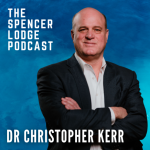Introduction
My guest this week has pioneered a new approach in the research of the end-of-life experience using the relevance of sleep experiences as a framework. To improve the quality of hospice care worldwide, Dr Chris Kerr – CEO and Chief Medical Officer for The Center for Hospice and Palliative Care in Buffalo, New York, has utilised his years of extensive research to validate the powerful dreams and visions that many of his patients experienced. His research was the subject of his acclaimed book release ‘Death is But A Dream’, as well as his TEDx Talk, which received over 3 million views and led him to be featured on the recent Netflix documentary “Surviving Death”. Dr Kerr talks about his ongoing research, which hopes to bring comfort and meaning to the dying process, discover its impact, and explain how it can help enable post-traumatic growth. Join me as I speak with this astounding Physician, who shares his journey exploring these patient experiences and pre-death dreams.
Show Notes
Chris introduces himself and his professional background and study in Palliative care, as a specialist in the study of the experience of death. [3:36]
Chris shares his research and findings from patients who have described highly virtually realistic dreams and sleep experiences when on their approach to death, with consistent, profound and therapeutic similarities. [5:20]
Chris discusses particular patients and conditions that his research has been based on, sharing factors that may cause selection bias due to being either foreseen and accepted or cases of sudden onset or acute deaths. [10:55]
Chris explains how a person’s mentality, physical state and relationship to the idea of death, whether it be fear of or acceptance, has taken effect on their subconscious mind and their sleep experiences leading up to death. [14:36]
Chris shares any findings or differences in his research with regard to the patients’ belief systems and any effects this has had on their behaviour and sleep experiences in the lead up to their deaths. [16:35]
Chris explains the differences in his particular research, being non bias and following a framework of patient care, with relation to other medical professionals and their practices. [18:32]
Chris discusses if his own experiences and pain surrounding death served as a catalyst for him to specialise in this area of research, with his career at one earlier stage including Hospice work. [21:10]
Chris shares how public interest in response to his Ted Talk from families grieving loved ones, caught the attention of Netflix who approached him to feature on their current docuseries “Surviving Death”. Chris shares how he is also planned to feature on the CBS documentary “Death is but a Dream” in March 2021. [25:34]
Chris shares a story being approached by an Emmy-award winning Film Producer, who shared her research that correlated remarkable similarities with his findings and the beliefs of various indigenous Australian and Amazonian tribes. [29:21]
Chris explains his future plans for further research, referencing a forthcoming book currently in development that is centred around a body of research concerning post-traumatic growth. [32:15]
Chris shares from experience, the common similarities and wishes of people who are dying, and how they best seek comfort and peace. [39:38]
Chris explains the emotional connection as a human being to his work and the many patients he has worked with during his career. [42:33]
Chris closes the interview sharing details of his 2020 book release “Death is but a Dream: Finding Hope and Meaning at Life’s End”. [49:02]
Quotes
“Dying is by definition, it is as progressive state of sleep” [4:40]
“Medicine is about defying death, and denying it, not actually looking at it experientially”. [6:42]
“As your life winds down, you automatically stop focusing on the trivial issues… you go to things that matter most, and you naturally reflect”. [8:21]
“I wanted the words of the dying to be validated onto themselves. It’s a mystery unto itself – I didn’t want to colour it”. [19:59]
“There’s something at a very human level that has meaning and value, even while what you’re experiencing is loss”. [33:40]
Social Links
Website: drchristopherkerr.com
Instagram: instagram.com/hospicebuffalo/
Facebook: facebook.com/HospiceandPalliativeCareBuffalo/
Twitter: twitter.com/hospicebuffalo
LinkedIn: linkedin.com/company/hospice-buffalo/






